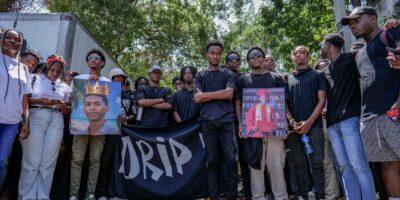The next Haitian revolution is rooted in our past because we have gone too long without acknowledging what we have done to each other. We can look to the West and blame the white overlords, but we’ve done that since 1804 and that’s gotten us nowhere. The next revolution is forgiveness, because without it, the cycle will persist
I recently sat with two foreigners and listened to them chime off name after name; who did this and that, and who’s associated with this or that gang. Being the only Haitian, it was assumed I would know all of these details but to both of my colleagues’ dismay, I merely stared at them, blinking audibly. They asked me how to make sense of what’s happening in my country and without hesitating I said “This makes perfect sense to me.” From the Duvalier, to the military, to Aristide, to Martelly and so on, the pattern is the same. Duvalier set the example of using the state as his own private bank and catalyzed the dysfunction of our public institutions, thus securing a foundation of sand for the future. And here we are…
The Americans have designated armed groups terrorists, our government hired private mercenaries, every neighborhood is putting up gates, and Port-au-Prince is effectively reduced to Pétion-Ville. Civil society is calling for a “war budget” and people are making blanket statements about the gangs like “kill them all.” The calls for the revolutions of old persist. We went from koupe tèt boule kay (cut off heads and burn houses, cries of the 1804 revolution) to bwa kale. Been there, done that. More violence, more coup-d’états.
Calls for dialogue and negotiations are slipping away like sand through our fingers. We cannot negotiate with whomsoever the Americans have deemed “terrorists”. A timely designation, wouldn’t you say? But amidst all the noise, I’ve yet to hear one concrete, realistic action proposed. The calls for dialogue are between the state and civil society and the calls for action center on violence. Talk and more talk but no one is actually doing.
A revolution is certainly in order, but one that seeks to foster a place where people live in peace. A peace that is not merely the absence of violence, but the prevalence of tranquility. And the precursor to this peace is forgiveness.
Julia Alvarez tells the story of Las Mariposas in the Dominican Republic under Trujillo in the 1930s. In the book, there is a scene where one of the revolutionary sisters says “That would be the real revolution we would have to fight: forgiving each other for what we had all let come to pass”.
The next Haitian revolution is rooted in our past because we have gone too long without acknowledging what we have done to each other. We can look to the West and blame the white overlords, but we’ve done that since 1804 and that’s gotten us nowhere. The next revolution is forgiveness, because without it, the cycle will persist.
I am no historian. Nor am I an academic. On a good day, I’m academic adjacent. What I am, though, is a Haitian living in Haiti. And here is what I see.
I see all sides screaming at each other. The elite are accused of fostering inequality and abusing power and wealth, the gangs are accused of horrific crimes, the police are accused of corruption and abuses, the state are accused of pretty much everything. I see flawed human beings trying to survive in a deeply flawed environment that is essentially a breeding ground for exactly what we are seeing.
In my position of privilege as a member of this “elite” class, I see a lot of abuse. On all fronts. I hear wealthy people bemoaning their loss of access to their beach front homes because “those people” won’t even let them have any fun.
I see the way that people treat their home staff, essentially embodying the very colonial abuses of the US and the West that we purport to hate. I see how our status lets us cut in line at a public office, walking by the dozens of people who wait for hours as if we are more important. I see the accumulation of wealth of individuals who cannot conceive of having to pay people $5 instead of $3.50 a day.
I see them buy their house on the beach, the other one in Miami, and the six-figure cars, and the trips, and the investment property. I also see them pay off this judge and that cop. I see them at dinner parties and weddings, and christenings.
From my hillside house, I also see a boy who was put in an adult prison and abandoned by his family only to find purpose and belonging in the only space that welcomed him. To become one of the most powerful chèf in all of Haiti.
I see that boy actively seek external validation from the public to show that he made it. He became powerful despite having been abandoned and tortured as a child.
I see well intentioned people take on a public office and inherit a gangrenous system that they have to navigate without any remedy, and hope to come out untainted. I’ve seen those who do get tainted, and I’ve seen them justify it with “degaje pa peche,” or “getting by isn’t sinning.”
I also see the police officers who hope to make an honest living and find themselves in minimal numbers, surrounded by people who would see them dead, with very little hope of back up. I see those rarely paid police officers acting as personal body guards to wealthy people in a grocery store, pushing their carts.
I see these elites in the little bubble that’s been created to sustain us. I’m related to some, grew up with others, and say polite hellos to many. Always polite. I see that boy over and over and over in the thousands of faces of the bandi. I see these government employees who got the job because someone higher up was looking out for them. And I see the police officers who smile and offer reassurances and remember to say “bòn fèt drapo!” (happy flag day) because somehow they still have the capacity for national pride.
We are all victims, just as we are all guilty. As all sides scream endlessly across the table, accusing each other of this and that, our country is breaking. Haiti is not just a country, Haiti is a feeling, an idea. As people grow wearier and more embittered, the feeling fades and the idea will be lost.
As fledgling ideas about peace emerge, I’m concerned that we aren’t prepared for the reality of what that means.
We are still having conversations in silos, and there are fewer new faces in the spaces of “dialogue”. Same shit, different day. Peace is recognizing that as a society, we created Izo, and Barbeque, and Ti Makak who emerged inside one of the most affluent neighborhoods in the capital, not a “popular neighborhood”.
Mandela taught us that “If you want to make peace with your enemy, you have to work with your enemy. Then he becomes your partner.”
Peace is understanding that we will have to forgive people for how they chose to survive. We will have to forgive and we will have to make these “combattants” become productive citizens of our communities. Let them become army engineers, road maintenance or waste management crews, technicians, agriculturers, memory workers; let them fill roles that are needed. Let them find peace so that we as a collective can be at peace.
Naturally, all perpetrators and orchestrators of this crisis must be held accountable for their crimes, but they will die before they stop what they’re doing if we do not give them a chance to share their stories and find new purpose. If we don’t take the time to understand the elements and conditions that allowed for this crisis, we will never succeed. Peace is not an institutional process, it is a human one. Every Haitian knows how to have a chita pale and I genuinely and empirically believe that Haitians are capable of helping each other out of this crisis.
The incessant narratives about Haitians being inherently violent are just the updated version of the “savages” versus the “civilized.” And despite the West’s best attempts to convince us that we are savages, Haitians are highly observant, intelligent, compassionate and collaborative people. I see it everyday.
I see it in the guys who do traffic control at the tap tap stations who are very aggressive and always seem poised for a fight. I see them run to the middle of the street to stop all traffic to let school children or an overburdened machann cross the street. I see the tap tap drivers who keep spare change on their dash boards for the street kids.
I see the bandi, straining against the weight of his AK-47, who stood outside a kidnapped woman’s cell so that she would not be raped. I see the 19-year old who guarded my aunt when she was kidnapped, and the chocolate he brought her when she was released on Valentine’s Day.
I see the light-skinned boujwa who calls dozens of people to find the best available cancer care for her maid of many years who is always fussing over her. I see the maid who took care of my grandmother and her 11 children, and who supported them financially when the dictatorship took my grandfather. I see her tombstone next to my grandmother’s.
The way forward is one based on compassion and healing from new and old wounds. It is our peace to define and ours to foster and for this we will have to forgive each other. As Haitians, yes, but as humans first.
By : Isabelle Clérié
Isabelle Clérié is a Haitian anthropologist and transitional justice expert with over a decade of experience leading truth-telling, memory, and restorative justice efforts in Haiti and other conflict-affected settings. Her work centers community voice, historical accountability, and healing in contexts of systemic harm. She is also the author of Repairing Development, a column at Proximate that critically examines power, philanthropy, and locally led change through a justice-centered lens.
Cover |A protest in Port-au-Prince. Photo : Hector Retamal
► AyiboPost is dedicated to providing accurate information. If you notice any mistake or error, please inform us at the following address : hey@ayibopost.com
Keep in touch with AyiboPost via:
► Our channel Telegram : Click here
►Notre Channel WhatsApp : Click here
►Our Community WhatsApp : Click here







Comments